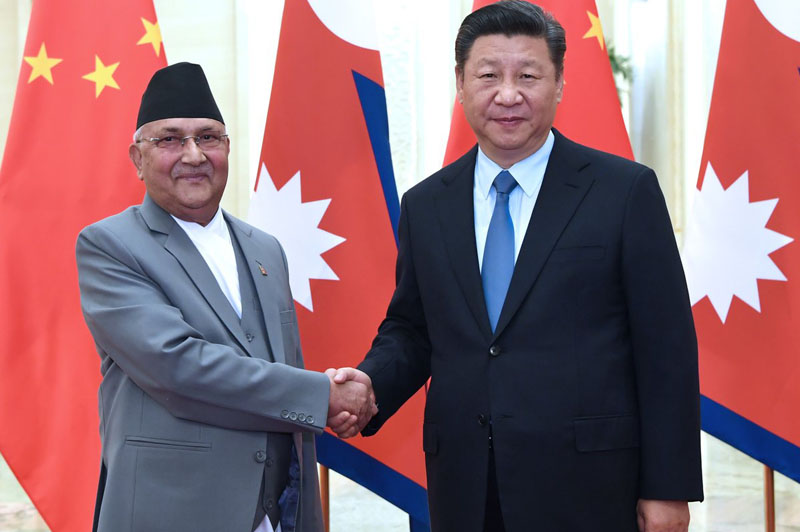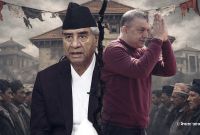Prime Minister Oli’s “China Card” and the BRI Agreement: A Critical Analysis

By Anil Tiwari
Before his visit to China, Prime Minister KP Sharma Oli had boldly declared, “Nepal will not take loans; we will only accept grants.” This statement raised public expectations that the ten projects listed under the Belt and Road Initiative (BRI) agreement would be financed entirely through grants. However, upon analyzing the agreement and its outcomes, it becomes evident that Nepal has not received even a dollar in grants. Instead, the Chinese government has conveyed a clear message to Nepal: “Don’t discuss grants; let’s negotiate if it’s about loans.”
The Pokhara International Airport and BRI Debate
The much-discussed Pokhara International Airport, constructed with Chinese loans, has become a point of contention. The airport, touted as a BRI project, remains underutilized and has yet to meet its envisioned objectives. Despite the significant financial burden incurred during its construction, the Oli government failed to negotiate debt forgiveness or secure any grants during the China visit. This silence on such critical issues raises questions about the effectiveness of the agreements signed during the visit.
Legal Ambiguities in the BRI Agreement
The BRI agreement lacks clear provisions distinguishing between loans and grants, leaving room for legal and political interpretations. The inclusion of Clause 5(4), which allows for separate negotiations for each project, has been criticized as a face-saving clause for Nepal. Critics argue that this clause may have been inserted to appease domestic audiences without securing concrete benefits from China.
Balancing India and China: A Diplomatic Challenge
Prime Minister Oli’s visit to China came after India declined to extend an official invitation for a state visit. Breaking the tradition of making India the destination of a first foreign visit, Oli turned to China, signaling a strategic shift. However, his use of the “China card” to counterbalance India drew mixed reactions. Former Prime Minister and Maoist leader Pushpa Kamal Dahal (Prachanda) commented that Oli’s move was aimed at maintaining equilibrium with India, sparking further political debate.
BRI: A Development Opportunity or a Debt Trap?
China has made it clear that the BRI is a commercial loan mechanism, not a charity initiative. The program is deeply embedded in China’s geopolitical and economic ambitions, including expanding its influence through military and strategic corridors. Nepal’s delegation, led by Prime Minister Oli, failed to secure debt relief or significant concessions, highlighting a lack of preparedness and negotiation power.
Lessons from Global BRI Experiences
Countries like Sri Lanka and Pakistan offer cautionary tales about the BRI’s implications. Projects under the initiative often lead to financial dependence on China due to high-interest loans. While institutions like the World Bank and the Asian Development Bank provide loans at interest rates as low as 0.25%–3%, Chinese loans under the BRI carry interest rates as high as 6.3%. This stark difference raises concerns about Nepal’s increasing vulnerability to China’s debt-trap diplomacy.
Economic Implications for Nepal
The construction cost of the Pokhara International Airport, initially estimated at NPR 22 billion, ballooned to NPR 25.34 billion due to delays and cost overruns. Such projects, financed by expensive loans, put immense pressure on Nepal’s financial resources without delivering proportional economic returns.
Global Geopolitics and Nepal’s Strategic Position
In the current global scenario, where major powers are realigning their strategies, Nepal’s geopolitical importance as a landlocked country between two economic giants, India and China, is undeniable. However, Nepal’s political leaders have often been accused of prioritizing short-term political gains over national interests.
Conclusion
Prime Minister Oli’s China visit highlights the complexities of Nepal’s foreign policy and economic strategy. The inability to negotiate grants or achieve significant concessions under the BRI reflects weaknesses in Nepal’s diplomatic and negotiation capabilities. At the same time, the visit underscores the need for Nepal to adopt a long-term vision that balances relations with its neighbors while safeguarding its economic and strategic sovereignty.
For Nepal to benefit meaningfully from initiatives like the BRI, it must prioritize transparency, strategic planning, and diplomatic finesse. Oli’s visit, while significant, fell short of delivering tangible outcomes for Nepal’s development and financial stability.

Anil Tiwari, a resident of Birgunj, is a senior journalist with specialized expertise in Nepal-China relations.
Anil Tiwari



![From Kathmandu to the World: How Excel Students Are Winning Big [Admission Open]](https://nepalaaja.com/img/70194/medium/excel-college-info-eng-nep-2342.jpg)
